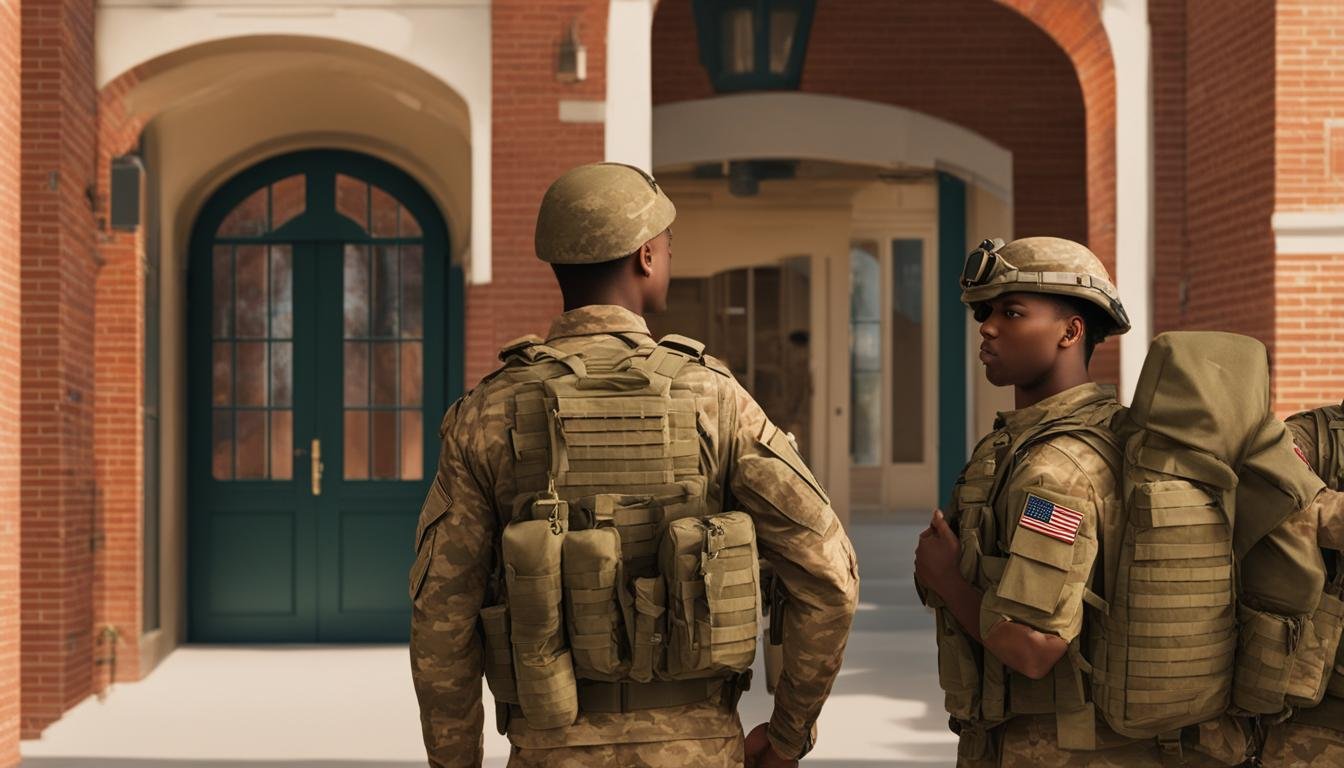As a military student, navigating the transfer policies of higher education institutions can be a complex task. Understanding these policies is crucial to maximizing the benefits available to you and ensuring a smooth transition between colleges. In this article, we will delve into the various transfer policies for military students, highlighting the eligibility requirements, the impact on academic success, and important considerations when comparing policies across universities.
Key Takeaways:
- Transfer policies for military students can allow the unused education benefits to be transferred to immediate family members.
- Eligibility for transfer often requires a minimum of six years of service and an additional commitment.
- Dependents may still be eligible to use transferred benefits under certain circumstances.
- Navigating transfer policies requires understanding the requirements and utilizing resources such as Military OneSource and the Department of Veterans Affairs.
- Favorable transfer policies and support services can greatly impact academic success for military students.

When it comes to transferring education benefits as a military student, there are specific requirements and processes that need to be followed. Understanding these policies is essential to ensure a smooth transition and maximize the benefits available to you. Here’s what you need to know:
Eligibility Requirements
In order to transfer education benefits, service members must have served at least six years and commit to an additional four years. This commitment is necessary to qualify for the Post-9/11 GI Bill transferability option. Additionally, the transfer request must be approved by the branch of service to which the service member belongs.
It’s important to note that each branch may have its own specific requirements, so it’s crucial to consult the official guidelines and your commanding officer for accurate information. In some cases, additional documentation may be required, such as a statement of understanding or a transfer eligibility status verification report.
The Transfer Process
The process for transferring education benefits can be completed online through the milConnect website. This portal allows service members to manage and track their benefits and initiate the transfer process. It’s important to ensure that all required information is accurately entered and that you follow the instructions provided to complete the transfer successfully.
Furthermore, it’s important to remember that the transfer process can take time, so it’s advisable to initiate it well in advance before you plan to start your education at the new institution. This will allow for any necessary approvals and ensure a seamless transition.
By understanding the eligibility requirements and following the proper transfer process, you can navigate college transfer policies as a military student more effectively. Utilizing the available resources, such as Military OneSource and the Department of Veterans Affairs, can provide valuable guidance and support throughout the process.
| Resources | Description |
|---|---|
| Military OneSource | A 24/7 resource providing information and support for military families, including guidance on transfer policies and benefits. |
| Department of Veterans Affairs | The official government agency responsible for administering education benefits for veterans and their dependents. Their website offers comprehensive resources and information on transfer policies. |
Impact of Transfer Policies on Academic Success
Favorable transfer policies for military students can significantly impact their academic success. Clear transfer policies and support services can streamline the transition between colleges and ensure that military students receive appropriate credit for their prior education and military experience. On the other hand, navigating transfer policies can be challenging for military students, especially if there are discrepancies between different institutions. Advocacy for favorable transfer policies and more standardized guidelines can help alleviate these challenges.
“Having clear and transparent transfer policies is crucial for military students to make informed decisions about their educational journey,” says John Smith, a veteran and advocate for military-friendly policies. “If military students have to go through a complicated and confusing process to transfer their credits, it can hinder their progress and potentially discourage them from pursuing higher education.”
One of the key impacts of transfer policies on academic success is the recognition of military experience as valuable education. Many military students have acquired skills and knowledge through their service that directly translate to academic credit. However, not all colleges and universities have clear guidelines on how to evaluate and award credit for military experience. This lack of consistency can lead to discrepancies in the amount of transfer credit awarded, which may affect the time and resources required for military students to complete their degrees.
Furthermore, the complexity of transfer policies can create additional challenges for military students who may already be navigating other transitional factors, such as deployments or frequent relocations. Understanding the intricacies of transfer policies at different institutions can be time-consuming and overwhelming, potentially causing delays in enrollment or confusion about eligibility requirements. Streamlining and standardizing these policies can provide much-needed clarity and support to military students as they pursue their educational goals.
Table: Comparing Transfer Policies Across Universities
| University | Acceptance of Military Credits | Dedicated Support Services for Military Students | Specific Requirements or Limitations |
|---|---|---|---|
| University A | Accepts all military credits | Comprehensive support services available | No specific requirements or limitations |
| University B | Limited acceptance of military credits | Basic support services available | Requires additional documentation for credit evaluation |
| University C | No acceptance of military credits | No dedicated support services | Does not offer transfer options for military students |
Comparing Transfer Policies Across Universities: Important Considerations
When it comes to transferring from one university to another as a military student, comparing transfer policies is crucial. Each university may have different requirements and limitations, so it’s essential to gather all the necessary information to make an informed decision. Here are some important considerations to keep in mind:
Acceptance of Military Credits and Experience
“It’s important to find out if the university accepts military credits and experience towards degree requirements,”
Some universities have specific policies in place to recognize and value the education and experience gained during military service. They may grant credits or offer alternative pathways for military students to meet certain requirements. Researching and comparing the acceptance of military credits and experience across universities will help military students determine which institutions are more aligned with their academic goals and maximize their previous education.
Dedicated Support Services for Military Students
“Having dedicated support services for military students can greatly contribute to their success and smooth transition,”
Look for universities that prioritize the needs of military students by offering dedicated support services. These services may include academic advising tailored to the unique circumstances of military students, access to resources and networks, assistance with benefits and financial aid, and a supportive community of fellow military students. These services can make a significant difference in a military student’s overall experience and academic success.
Specific Requirements and Limitations for Transferring Benefits
“Understanding the specific requirements and limitations for transferring benefits is crucial for a smooth transition,”
Each university may have its own set of requirements and limitations when it comes to transferring benefits. It’s important to carefully review and compare these policies to ensure a seamless transition. Consider factors such as the minimum number of credits required to transfer, any specific courses or prerequisites that need to be fulfilled, and whether there are any limitations on the types of benefits that can be transferred. This information will help military students plan their academic journey effectively and avoid any unexpected challenges along the way.
By comparing transfer policies across universities, military students can make informed decisions and choose the institutions that best meet their needs. Considering factors such as the acceptance of military credits and experience, dedicated support services, and specific requirements for transferring benefits will ensure a smoother transition and maximize the benefits available to them.
Conclusion
Understanding transfer policies for military students is crucial to ensure a successful transition between colleges. Military-friendly transfer policies that recognize and value the unique experiences and education of military students can greatly contribute to their academic success.
By utilizing resources, comparing transfer policies, and advocating for favorable policies, you can navigate the transfer process and make the most of your education benefits. This involves carefully considering different universities and their acceptance of military credits and experience.
Remember to gather all the necessary information from potential universities to ensure a smooth transfer and maximize the benefits you are entitled to. With the right support services and standardized guidelines, the successful transfer of military students between colleges can be achieved.
FAQ
What is the Post-9/11 GI Bill?
The Post-9/11 GI Bill allows service members to transfer unused education benefits to immediate family members, including spouses and children.
Who is eligible to transfer education benefits?
Service members must have at least six years of service and commit to an additional four years to be eligible for transferring education benefits.
Are there any circumstances in which dependents may still be eligible to use the benefits?
Yes, dependents may still be eligible if the service member separates due to a medical condition, disability, hardship discharge, or a reduction in force.
What happens if the service member separates for other reasons?
If the service member separates for reasons other than those mentioned before, their dependents won’t be eligible to use the transferred benefits.
How can service members transfer education benefits?
Service members must have served at least six years and commit to an additional four years. The transfer request must be approved by the branch of service, and there may be additional requirements, such as filing a statement of understanding. The process can be done through the milConnect website.
Where can military students find resources to understand transfer policies?
Military students can utilize resources such as Military OneSource and the Department of Veterans Affairs for guidance on understanding transfer policies.
What factors should military students consider when comparing transfer policies?
Military students should consider factors such as the acceptance of military credits and experience, dedicated support services for military students, and any specific requirements or limitations for transferring benefits.
How can military students ensure a smooth transition between colleges?
Military students should gather all necessary information from potential universities and compare transfer policies to maximize the benefits they are entitled to.
How can favorable transfer policies impact military students’ academic success?
Favorable transfer policies can streamline the transition between colleges, ensure appropriate credit for prior education and military experience, and contribute to military students’ academic success.
Military students can utilize resources, compare transfer policies, and advocate for favorable policies to navigate the transfer process effectively.



